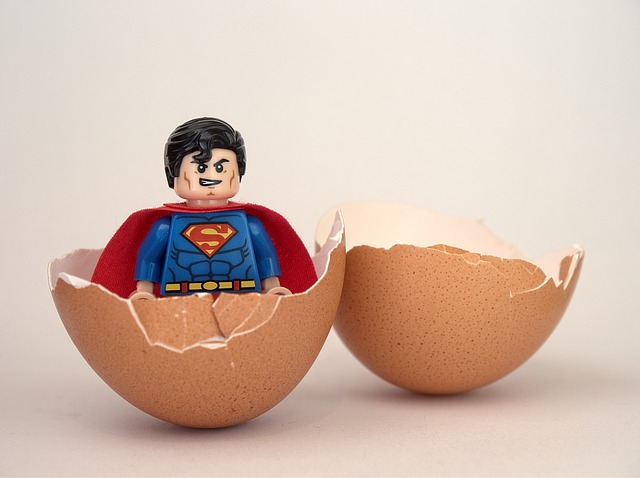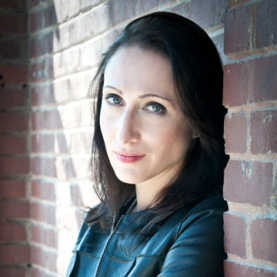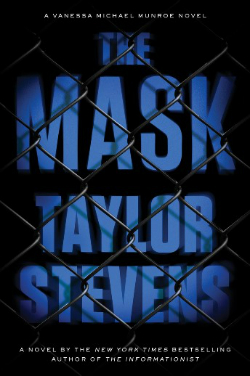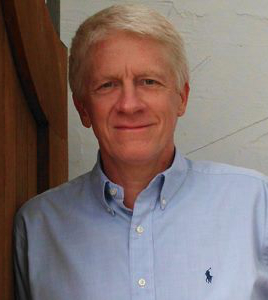
Our guest today is New York Times bestselling author, Taylor Stevens. A full transcript of the interview is below.
Podcast: Play in new window | Download | Embed
Subscribe Apple Podcasts | Android | RSS
Today’s show is a little bit about Superman, but it’s more about Clark Kent.
 It’s a discussion about recognizing when it’s time to take off the superhero cape and make the time to refocus on what’s important in your life and business.
It’s a discussion about recognizing when it’s time to take off the superhero cape and make the time to refocus on what’s important in your life and business.
Our guest is my friend and podcasting partner, New York Times bestselling and multiple award-winning author, Taylor Stevens. She’s the author of the Vanessa Michael Munroe thriller series and I whenever I talk about her books to friends who love to read I refer to her as my favorite living author.
Today’s show is more conversation than an interview, and the topic is pushing yourself beyond the breaking point, taking on more than you should, and in general, sacrificing your health at the altar of greater productivity.
Transcript
Stephen: Okay, Taylor. Longtime listeners to this (our joint podcast, The Taylor Stevens Show) show probably know that you took a break around the end of last year, because you were exhausted – burned out, mentally used up essentially – in the writing business for a while. Can you talk about what led up to that process, and what allowed you to make the extraordinary decision to just walk away for a period of time?
 Taylor Stevens: Well, what’s really funny is we’re getting close to a year since that happened, and I’ve already forgotten so much. (Joint laughing). So much is crammed into a day, sometimes it feels like I’m just living day-to-day. I had gotten burned out, like you said. There was nothing left. I would sit there, and I was just forcing it. Just dry tank, wheels off, running on the hubs, scraping the concrete, sparks flying, just trying to cross the finish line on what I had done prior. When I reached that finish line, I just said, “That’s it, I’ve got nothing.” and the idea of starting the next project was like I would be wasting my time – I wasn’t going to get it done, then I would be frustrated, because when I’m in that mode of trying to race the finish line, nothing else is getting done, and life is just falling apart all around me. So I just took a step back, took some time off, and refused to even allow myself to turn the computer on most days, and just lived, and got other things done, spent time with friends and family. And it was really hard. It was really, really hard, as much as I needed it; it did not come naturally.
Taylor Stevens: Well, what’s really funny is we’re getting close to a year since that happened, and I’ve already forgotten so much. (Joint laughing). So much is crammed into a day, sometimes it feels like I’m just living day-to-day. I had gotten burned out, like you said. There was nothing left. I would sit there, and I was just forcing it. Just dry tank, wheels off, running on the hubs, scraping the concrete, sparks flying, just trying to cross the finish line on what I had done prior. When I reached that finish line, I just said, “That’s it, I’ve got nothing.” and the idea of starting the next project was like I would be wasting my time – I wasn’t going to get it done, then I would be frustrated, because when I’m in that mode of trying to race the finish line, nothing else is getting done, and life is just falling apart all around me. So I just took a step back, took some time off, and refused to even allow myself to turn the computer on most days, and just lived, and got other things done, spent time with friends and family. And it was really hard. It was really, really hard, as much as I needed it; it did not come naturally.
Stephen: I think for most people, the idea of finishing a project and then taking a break makes a lot of sense, but it’s not something you had ever done before.
Taylor: No, never had done before.
Stephen: So, what was your typical process? Finish a project and what? Drink a glass of wine, and start the next day on the next thing?
Taylor: Pretty much, yeah. There might be a few days in between, to get some bills paid, and maybe sweep the floor, and wash some dishes, wash some laundry or something, but mostly it was just, “alright, well that’s done. Now, open up the next file that I had already been fiddling with, and my ideas are already there, and let’s get going.” Or there would be some other thing. Lots of time when you’re writing, you’re in the publishing cycle; while one book is being written, there’s another one that’s being edited, and another one that’s being published and you’re doing promotion on. So there’s usually a lot of juggling of things going on at the same time. You get one book sent off, and it’s like nothing even happened – you’re already spinning into whatever it is that’s been backed up and needs to get taken care of yesterday.
Stephen: I”m thinking of how different we are, and how different our backgrounds are. For The Author Biz listeners who may not know, I’ll put a link to the first show we did, where we talked a little bit about your background, but you were raised not in the United States, and you were raised in a religious cult, and it was an unusual way of being raised. I was raised in an upper-middle-class family in the Midwest, and had a “Leave it to Beaver”-type family environment, yet we both come at almost everything we do from a “working harder will get you further” mentality. In whatever we’ve been working on, that is the mentality we’ve used to achieve whatever levels of success we’ve achieved in life. I find that interesting, because we’re so different, our backgrounds are so different.
 Taylor: I don’t know how you feel about it, but I think it’s sort of a human nature thing – personality types, or what have you. Or maybe it’s just cultural, but we both come from close enough cultures in that sense that the whole work ethic type thing doesn’t matter. Maybe the motivations for why we do it might be a little different, possibly, but the end result is the same, in that we’re our own whip – we’re the horsewhip whipping ourselves to keep us running.
Taylor: I don’t know how you feel about it, but I think it’s sort of a human nature thing – personality types, or what have you. Or maybe it’s just cultural, but we both come from close enough cultures in that sense that the whole work ethic type thing doesn’t matter. Maybe the motivations for why we do it might be a little different, possibly, but the end result is the same, in that we’re our own whip – we’re the horsewhip whipping ourselves to keep us running.
Stephen: Eventually, if you keep whipping the horse, the horse falters (Laughing) and dies.
Taylor: Yeah, that’s kind of what happened to me.
Stephen: Yeah, and it happened to me a few weeks ago, and I’m just sort of coming over it now. I had some minor health problems, but they all related from self-imposed stress. My way of getting more done is to just sleep less, and so I started getting up at 5, and then I started getting up at 4, and then I started getting up at 3, and then I started getting up at 2:30, so that gave me enough time to get done what I needed to get done.
Taylor: Oh my god! Does your brain function on so little sleep that it’s even productive time?
Stephen: (Pause) It functions well enough. And it always has. As Author Biz listeners may or may not know, I was in the technology business for a long time, and there was this culture in the startup world, where the only way to be successful is to work 70, 80, 90 hours a week. I can clearly remember times when I would go into the office at 6 [a.m.] and leave at 10 [p.m.], for six weeks in a row, just because of something that needed to be done. But I was a lot younger back then.
Taylor: Yeah…
Stephen: I’ve never made any allowance for passage of time, and all of a sudden it caught up with me, a few weeks ago. I had Colleen Story on the show maybe ten episodes ago.
Taylor: For the Taylor Stevens show listeners, can you explain?
Stephen: Yes, on The Author Biz show. Colleen writes a blog called “Writing and Wellness,” and it’s essentially taking care of yourself as an author, and the things you need to do because our focus is so much keeping your butt in the chair.
Taylor: Right.
Stephen: And if you keep your butt in the chair, bad things start to happen to your body, after a while.
Taylor: Oh my gosh, yes. That’s true.
Stephen: That show inspired me to start running again, and to start paying attention to some of these things. Oddly enough, while I was sleeping less and less, I had more time to go running! I was in the best shape I’d been in for fifteen years or so I felt great. I had energy, everything was going well. And then I just hit, essentially that same period you hit a year ago, where you just couldn’t do it anymore – except my body told me I couldn’t do it anymore by having something happen.
Taylor: Wow.
Stephen: And then you have that period of reflection. Yours was about a month, mine…
Taylor: It’ll probably be about a month, before you’re back up into it again.
Stephen: It probably will be. And I want to be back up into it differently than I was before, because I’m not thirty anymore!
Taylor: I don’t even think 30 year-olds should be doing that. (Laughing)
Stephen: It’s interesting to me – the number of authors I’ve interviewed who are dealing with the same thing. I go back to Annie Bellet, who was a very popular interview on this show, and I will link back to it in the show notes, for the Taylor Stevens Show listeners. Annie writes fantasy, and she went through a period of about a year, where she was really just grinding it out, trying to do this thing that’s so popular in the Indie world, where the only way to be successful is to just keep writing, and just keep publishing books on an ever-increasing schedule. It wasn’t working for her, and her body just gave out.
Taylor: Right.
Stephen: She went to a different process, and she’s been very successful. But it’s so much like the startup world, where there’s only one way to be successful – mentally, in our own heads, there’s only one way to be successful.
Taylor: To produce.
Stephen: To produce! To keep producing, and to keep producing more.
Taylor: Yeah.
Stephen: Some people can do it, and in the business world, I used to be able to do it. There’s no way I could do it anymore. Oddly enough, we transition whatever our history is into our writing process. For me, I feel like during the day, I should be doing these things, because that’s when I worked before. I had these work hours. You get up, you start working. It’s such a different world as an author; you have so much control over your schedule, over your time, over what you’re producing, how much you’re going to produce, and, in a lot of cases, if you’re an Indie, even over your deadlines.
Taylor: Yeah, and I think the same benefit is the same downfall, is that it’s on you. So, if you’re a driven person, you’re going to drive yourself really hard, especially when you’re not meeting the volume, or the pace, or the production level that you feel that you should be able to do. I think, honestly, as an author, you’re always going to feel like you’re behind. Always. It’s never going to be enough, you always should be doing more. And because you don’t have to drive into the office, it’s the flipside of the coin. There will be those who have to basically bribe themselves to get into the chair, and there are those who will have to bribe themselves to get out of the chair. So, it seems like it’s a life of extremes, and so many other things get forgotten. When you’re focused like that on, “trying to get this done, trying to get this done,” it’s really easy to push all the other things aside. One of the things I learned is that it’s really not healthy, emotionally or mentally, to put all your eggs in one basket. By that, I mean when all your sense of self, or your identity, or your feelings of accomplishment are tied into the work that you’re producing on the screen, and then that work is perpetually not good enough, or perpetually behind, you can really begin to lose sight of what’s important in life, because you’re so focused on always chasing a goal post that’s constantly moving.
 Stephen: Alright. Let’s talk about deadline-driven pressure. You’re a traditionally-published author, so in some cases, you’re setting your own deadlines, in other cases you’ve got a publishing deadline, where something’s got to be ready by a certain date. There are times where you just have to make it happen. You can want to have a balanced life with every fiber of your being, but you’ve got to have this manuscript done by a week from Friday, so you’ve gotta do whatever you can to make that happen.
Stephen: Alright. Let’s talk about deadline-driven pressure. You’re a traditionally-published author, so in some cases, you’re setting your own deadlines, in other cases you’ve got a publishing deadline, where something’s got to be ready by a certain date. There are times where you just have to make it happen. You can want to have a balanced life with every fiber of your being, but you’ve got to have this manuscript done by a week from Friday, so you’ve gotta do whatever you can to make that happen.
Taylor: (Laughing) Yeah.
Stephen: How do you, as an author, try and avoid those crushes, and recover from them, and get back to normal when they’re over, get back to a normal working schedule?
Taylor: Ooooh. You see, that’s the problem. It’s kind of become the “normal,” right? Where that’s the perpetual state of normal. It’s a situation where you have to admit your own levels of ability, and have a good grasp on how long it takes you to do things, and just say “no” when it’s too tight. I’ve had to do that, when someone has said, “We want this to be the schedule,” I had to say, “No, I can’t, it’s too much, I won’t be able to do it,” and get it changed. There have been times where I’ve missed deadlines, and I’ve worked with my editor to accommodate for her schedule and mine – “What’s the drop dead date? What’s the wiggle room date?” We’ve never had to push publication of a book back because of missing deadlines, and I’m very keenly aware of the deadlines, but I’ve learned that sometimes, you just have to say “no,” and work around them, and you just do the best that you can.
Stephen: Saying no probably has to go beyond just things like deadlines. There are always demands on your time: can you do this interview, can you come teach, can you do this other thing. How do you manage all those other things? Because nobody just wants to say, “No.”
Taylor: This is very true, and I do have to say no a lot. When I do say no, it’s always with an explanation, so that people understand I’m not trying to be rude, or I don’t care, or don’t think they’re important enough. I have to say, “I’m sorry, I just can’t.” So far, those that I’ve had to say no to are quite gracious about it. Where it gets really tricky is more with home life – the things that I say no to because I’m not Superwoman, I can’t do it all. For example, I’ve never been fully involved with the school PTA, or things that go on. I’ve never been a volunteer on my kids’ field trips, or the class mom that goes in and takes care of things. Sometimes I have to skip Open Houses and things like that, too. I’m not able to cook wonderful, nutritious meals everyday…something’s gotta give. In my case, my kids have had to grow up, and I stopped doing their laundry for them when they were about 8 or 9 years old. I taught them how to use the washing machine, helped them when they had questions, showed them what to do, and they’ve pretty much been responsible for their own stuff ever since. Does that mean that the house is perfect and things are clean? No. That is the “No” that I had to just accept. It’s a tradeoff, this or that. For me, the writing is more than just something I do because it’s a hobby; it’s my job, it’s what pays the bills. It might be a little different if it didn’t have such dire consequences for not getting it done (Laughing), in which case it might be a little selfish of me to be going “no, no, no” to all these other things, but everybody’s situation is going to be different, and they’re priorities are going to be based on what is most urgent. For me, in my case, that is what’s most urgent.
Stephen: I think that’s one of the things that makes the show we do together, the Taylor Stevens Show, so interesting. For Author Biz listeners, we’ll talk about that a bit when we come to the close of this show, but we come at this from such different perspectives. For me, writing is new, and if it’s something I was doing to pay the bills, I don’t think I would be able to afford Ramen noodles, let alone the electricity to cook the ramen noodles (Joint Laughing). I’d be out collecting kindling wood for a fire.
Taylor: I could be in that position six months from now, who knows, but so far… (Laughing)
Stephen: That’s probably a fear that everyone has, no matter what level of success we have. An algorithm somewhere could change, and everything could be different tomorrow, and what’s working today is not necessarily going to work tomorrow. I want to get back, again, to this idea of saying “No.” I interviewed Honorée Corder a couple of weeks ago. As almost a throwaway line near the end of the show, she said that my default answer to everything is “No,” and that’s something that busy people say, but I’ve always been such a people-pleasing type person that I’ve had a hard time saying no. After she said that, I thought about it, and I actually talked to my wife Julie about it, and we just between the two of us, we just take on all this stuff to help in the neighborhood, or to help with the church, or to help with the grandson, and our default answer is always”Yes.” So I said, “That’s it! Our answer to everything is ‘No’ for the next two weeks,” and two days later, I got a call: “Can you help with this?” “Yeah, sure.” (Joint Laughing) I thought, “How am I gonna find the time to do this?!”
Taylor: Yeah.
Stephen: So how do you train yourself to say “No”?
 Taylor: First of all, it’s really good that you say “Yes” to a lot of those things. I think if the world was full of people who only said “no,” it would be a very cold and insular place. I think that probably the “Yeses” are going to have to fall more in line with whatever your life’s guiding principles are; the things that are most important to you, in terms of community and connection and all that. The ones that don’t feed that, and don’t help benefit your life or drive you forward, or fit in with what your true life values are, those are the easiest ones to say “no” to, simply because it’s easier to say, “Oh, wait. This doesn’t fit inside my long-term goals.” By “goals,” I’m not just talking about work, I”m talking about all the other aspects: philanthropy and volunteering, and all those other aspects. When you say “Yes” to something, it’s because it is bringing you closer to your core sense of value and self, and if it doesn’t fall into one of those things, then that should be the first you say “No” to.
Taylor: First of all, it’s really good that you say “Yes” to a lot of those things. I think if the world was full of people who only said “no,” it would be a very cold and insular place. I think that probably the “Yeses” are going to have to fall more in line with whatever your life’s guiding principles are; the things that are most important to you, in terms of community and connection and all that. The ones that don’t feed that, and don’t help benefit your life or drive you forward, or fit in with what your true life values are, those are the easiest ones to say “no” to, simply because it’s easier to say, “Oh, wait. This doesn’t fit inside my long-term goals.” By “goals,” I’m not just talking about work, I”m talking about all the other aspects: philanthropy and volunteering, and all those other aspects. When you say “Yes” to something, it’s because it is bringing you closer to your core sense of value and self, and if it doesn’t fall into one of those things, then that should be the first you say “No” to.
Stephen: Do you have a scheduled rest period? Like, “Sundays I don’t do any work,” or anything like that?
Taylor: Well, it depends on how you define “rest.”
Stephen: (Laughing) Because I know what you do on a lot of your weekends, I know the answer to that question is “No!” (Joint Laughing)
Taylor: Well, I have somewhat of a schedule where I step completely away from writing or anything work related, to this side of work, and it gets me outdoors, but it’s very physically demanding. It’s not rest, but it is rest. It’s difficult to categorize it one way or the other.
Stephen: Yeah. I can’t remember what book I read this from the first time. The idea is that being busy is a good thing, but you need to vary what you’re doing to be busy. So, maybe it’s running, or going out and doing the kind of physical labor that you’re doing to balance against the mental work, and the mental grind of writing, where you have a completion and a success point that might be four months away, and the work that you’re doing on the weekend is something you can start at 10:00 in the morning, and by 2:00 in the afternoon, you could say, “Woohoo! I’m done and it worked!”
Taylor: Exactly. When I reached that breaking point last year, and I realized enough was enough, I started taking on things that I wouldn’t have agreed to before because they’re time-consuming. But, I realized that, for my mental well-being, and emotional well-being, I had to find other ways to find some sense of fulfillment, other than working on a project that might take me a year to complete.
Stephen: How did that make you feel? I don’t mean to sound like Dr. Phil, but how did that make you feel to come up with that and then to actually do it, to have that sense of accomplishment?
Taylor: On the one hand, it felt really, really good, but on the other hand it can be frustrating sometimes, when all you want to do is get your darn work finished, and this other stuff is getting in the way! If you view being a workaholic as an addiction, then it’s really, really good, and when you’re frustrated with it, that’s just the addict in you that’s frustrated it can’t go get its fix.
Stephen: Interesting. For me, podcasting is something that is discreet. I’ll do an interview with someone like you, and I’ll produce the show, write the show notes, and it goes out, it’s done.
Taylor: So you get that sense of satisfaction.
Stephen: Right! As opposed to writing something, which, for me, takes forever. Then there’s always that sense of “It’s not good enough. If I could go back and just fix this one part, it would be better and it would change these other five parts, so that’s what I’m going to do.”
Taylor: Do you do that with podcasts, too?
Stephen: Never.
Taylor: Okay. Because I listen to them sometimes, the ones that we record. First of all, I’m very thankful for you, because you clean them up, and you make them sound so much better than they are when we’re talking! (Joint Laughter) But there are times when I’m like, “darn it, I should’ve said this other thing instead.”
Stephen: Yeah. It is the nature of doing this kind of thing. When I first started doing this, I would get really carried away, and I would try to make every episode perfect, and that’s a losing battle. A part of the reason why we’re doing this combo podcast today, is that I don’t have enough time and energy to record two shows this week. I don’t have enough time and energy to do our show and my show, so it made sense to do this one thing, because I’m so interested in it right now, and I know you have these strong feelings on the subject as well. What do we normally talk about on the Taylor Stevens Show?
Taylor: Normally, we’re kicking writing in the butt, one word at a time.
Stephen: One word at a time. Over the course of the last few weeks, we try and do a series of three or four episodes that are themed around one thing. We just finished one where we really went deep into the weeds on listener writing sample, where we went in – psh “we” – you went in, the New York Times Best-Selling Author (Joint Laughter), tweaked, and then discussed why you thought these changes would make the material read better. So we went really deep into the weeds for three straight episodes on this, covering three different areas, and people really enjoyed that. Call to Action for this week: if you’re an Author Biz listener, and you think you’d like that – if you’re interested in shows about craft, probably 80% of the Taylor Stevens shows are craft-related, isn’t that right?
Taylor: Yeah, especially the later ones. The earlier ones are a little more research heavy, but whatever they are, they’re a lot of fun, because Steve and I are just like, “hey, catch up! How’s it going?” (Laughing)
Stephen: Yeah, they are fun, and they’re funny, and we have a great time. Because we come at writing from such different perspectives, I think it’s interesting for people. For people that listen that are closer to my end of the spectrum, I play a valuable role, in that I’m almost the foil as the person that, “Oh, really?” is my response to everything that you say.
Taylor: Oh, Steve. You’re being very generous with that (Laughing).
Stephen: I learn from every episode, which is really helping me as a writer. That’s why we’re doing this show – not to help me, but to help people with these particular issues that we discuss in different shows. The individual episodes are pretty tightly described in the title and in the show notes, so it’s pretty easy to see – like, if you’re working on dialogue, we’ve done several episodes on dialogue. If you’re at all interested in a show about craft, come check it out. You can find it online at www.taylorstevensshow.com You can also find it through Taylor’s website which is?
Taylor: www.taylorstevensbooks.com
Stephen: …and on iTunes, and Stitcher, and Google Play, and everywhere fine podcasts are available. If you subscribe to The Author Biz, subscribe to the Taylor Stevens Show.
Taylor: For the Taylor Stevens Show listeners who are hearing this, for those of you who are interested in the actual business of writing, publication, and finding the different components – the people who do the editing and the graphic design; if you’re interested about what methods are working for authors and what aren’t, and finding your audience, you should really check out The Author Biz. Steve does a great job. He has fantastic guests on his show that are all experts in their own right, in their own different aspects in the publishing process. It’s definitely worth your time. You know Steve by now, you know he’s fun, and you know he’s going to give you good material. You’re just going to get more of the same.
Stephen: You can find that at www.theauthorbiz.com and it’s available wherever fine podcasts are sold. Thank you everyone for listening this week. This has been a fun joint episode.
Taylor: It’s been fun being with you. For my listeners, see ya’ll next week.
Stephen: For my listeners and for Taylor’s listeners, I will definitely see you all soon! I don’t know whether The Author Biz will be back next week, but I do know I’ll be back by the first of November, fully energized and ready to go! Thank you for listening!
Taylor: Thanks for being here.
Transcription provided by Jen McDonnell ([email protected])
Links:
Taylor’s website www.taylorstevensbooks.com
The Taylor Stevens Show podcast
Buy Taylor’s books at Amazon
Thanks for Listening!
Thanks so much for joining me again this week.
If you enjoyed this episode, please share it using the social media buttons you see on the left of the post.
Also, please leave an honest review for The Author Biz Podcast on iTunes!
Ratings and reviews are extremely helpful and mean a great deal to me. They matter in the rankings of the show, and I read every one of them. If you’re not sure how to leave an iTunes review, you can follow the step-by-step instructions here.
And finally, don’t forget to subscribe to the show on iTunes or Stitcher to get automatic updates.
Thanks to Taylor Stevens for joining us this week!

 Before getting into the business of writing I spent twenty-five years in the technology business as a financial guy, and then as a serial entrepreneur. I know what it takes to start and run a successful business.
Before getting into the business of writing I spent twenty-five years in the technology business as a financial guy, and then as a serial entrepreneur. I know what it takes to start and run a successful business.